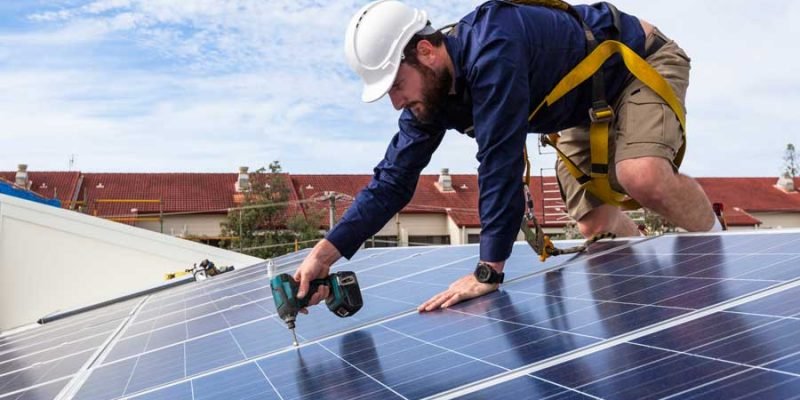If you’re looking for a new home improvement idea that will significantly increase the value of your home immediately, and at the same time make a big dent in your regular ongoing costs of running your home, then you should be thinking about installing solar panels.
The market for solar panels continues to grow. With that growth we see technology improving and prices reducing.
If you wanted to go ahead with solar panels, should you buy now, or maybe wait for another year or two to see if solar panels become even better at producing power and drop further in price.
Nobody can be certain about the future. There is no certainty that prices will continue reducing or that better technology will improve performance. It probably will happen, but sometimes innovative technology can make things more expensive! For example, iPhones continue to improve with every release, but I don’t see them getting any cheaper.
But remember, the cost of electricity is probably going to increase in future too. The more expensive the electricity, the greater the savings you’ll make from having a solar system on your roof.
If solar panels will work for your home and you can see the upfront cost and ongoing savings make sense now, then there’s really no reason to wait provided you can afford the purchase price now.
There are three mains solar panel options to consider.
Three Types of Solar Panels
Monocrystalline panels are the most efficient and put out the most power at 15% – 20%. However, they are the most expensive. They are best for homes that don’t have room for a lot of panels, so you want to maximize the power from each panel.
Polycrystalline panels are the least expensive and the performance isn’t too far behind monocrystalline panels at 15% to 17%. That makes them the best choice when your roof has plenty of room for a lot of panels.
Thin film panels are made differently from the crystalline panels and are much thinner and lighter, but their efficiency is much lower at around 11%. They are loess expensive because their lighter weight makes the faster and easier to install, leading to lower labor costs during installation.
They are best suited for commercial premises with huge roofs that can’t carry much weight. For residential homes, thin film is best again when a roof might not be able to take much weight, or when the shape of the roof does not allow the fitting of rectangular shaped crystalline panels.
But there are many other key considerations when selecting solar panels.
Is Your Environment Suitable for Solar?
If you live close to the north or south pole and have several months of total darkness, then your environment is less than ideal for solar.
But if you live in an area that has lots of sunshine hours then solar makes much more sense.
But that’s not the only environmental impact to consider. What if your house is surrounded by tall buildings or tall trees? You might get lots of sunshine through your windows, but if your roof is covered in shade most of the time, you might find that solar panels are of little use.
What is the condition of your roof?
If it needs repairs, you need to get this done before attaching solar panels. An old roof or one in poor condition may not hold the weight of the crystalline panels. If they can carry the less efficient thin film, will they produce enough power to make solar worthwhile?
How Long are You Staying?
To get the maximum benefits from a solar system, you may think that as solar panels are expected to last for 25 years, that you need to be intending to stay in your current home for at least that long too.
It may take several years before your electricity savings equal the purchase price of a solar system, but as soon as you put that solar system on your roof, you immediately increase the value of your home.
If you think you might move homes sooner rather than later, check with a few local real estate companies to get some idea of how much a solar system might increase the value of your home. You might get a pleasant surprise!
Energy Usage
How much electricity do you use?
If you live on your own in a little one-bedroom flat and already have an economical source of power with plenty of sunshine streaming into your home through a large window, then the cost of solar against the small savings you will make might not justify the purchase.
But the bigger the home, the more people in the home, and the more roof space you have available for solar panels, then the more likely that solar will make great sense and will save you not just cents, but lots of dollars too.
If your system is going to take more than 6 – 8 years to earn you back in power savings, the cost of the system, then solar may not stack up right now. You can always review this later.
Pick a Reputable Solar Supplier
With any newish or growing industry, you always get someone coming in looking for the quick short-term buck. Be wary of any company that has a core business in another area. It’s not unusual for companies supplying insulation to move into solar power, but they are different industries and require a different understanding of almost all sides of the business.
You will be better collaborating with a company that works almost exclusively in solar panels only and has already been around for more than just a few years.
Remember solar panels usually come with a 25-year guarantee. In the unlikely event you need to call on that guarantee, you want to have some confidence that your supplier will still be their 20+ years from now.
Tax Rebates
Local and federal governments may have incentives available to help reduce the cost of solar systems.
Be aware that any rebates that are available now may not be available in the future.
Once everybody is buying solar, governments will have no need to supply incentives to stimulate sales.
Your solar supplier should be able to tell you about the rebates available now in your location because those incentives help them sell their products.
The Cost
This is not just the cost of the panels.
But firstly, as you would with any purchase of anything that is going to cost several thousand dollars, get at least three quotes, and make sure the quotes are each for the same type of solar system, and all from reputable companies.
Your solar supplier should be able to help you analyze the cost of the system, with or without financing costs and interest, against the likely savings you will make based on your existing electricity usage.
The result will be how many years it will take for your electricity savings to recover your purchase cost of the system.
Then you can make an informed decision about whether those savings which will last for 25+ years are worth having.














Comments